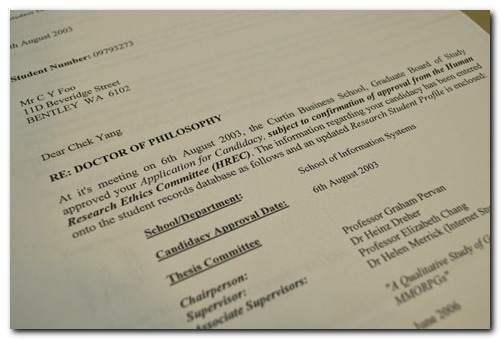Before I could actually start doing research in MMORPGs (the fun part!), I had to first prove to the faculty that my research was viable, accomplishable, and important. This was the Candidacy period, the culmination of which is a formal research proposal that you present to the faculty and supervision committee, who’d decide your fate: go ahead, or back to the drawing board. And you only get so much time to successfully pass your candidacy, because if you can’t, well, your keys to the research office will get taken from you LOL.
My specific topic focus on grief play in MMORPGs wasn’t readily apparent from the get go. I developed several ideas during the early months running up to the candidacy presentation, eventually narrowing it down to three in March. I wrote research specifications for all three, sent them out to academics involved in virtual worlds research, and asked for comments. Post returns and a lot more brainstorming and considerations, I decided on grief play. This topic was the most controversial in that it saw highly polarized opinion between all concerned parties, and typically elicited strong reactions from MMORPG participants. And lastly, no one else was doing similarly substantial research on this.
 Most doctoral students take about six months to complete their candidacy, and I took about as long too. I delivered my candidacy presentation on the 12 June 2003. I remembered the several rehearsals I did for two of my supervisors: Drs. Dreher and Helen Merrick. Funnily, I thought I was more convicted in my rehearsals than my actual day presentation. In any case, the timing for my delivery ended on the dot at 20 minutes sharp, and I remembered Dr. Dreher remarking thoughtfully that in his experience, few presentations ever ended rightly on time.
Most doctoral students take about six months to complete their candidacy, and I took about as long too. I delivered my candidacy presentation on the 12 June 2003. I remembered the several rehearsals I did for two of my supervisors: Drs. Dreher and Helen Merrick. Funnily, I thought I was more convicted in my rehearsals than my actual day presentation. In any case, the timing for my delivery ended on the dot at 20 minutes sharp, and I remembered Dr. Dreher remarking thoughtfully that in his experience, few presentations ever ended rightly on time.
I spoke for 20 minutes, and was queried for another 50 minutes. A few of those questions were tough as I had no ready answer for, given that this was a really new research area. I don’t think there was any concern about my ability to successfully complete the project, and my passion for it was obvious enough, hopefully.
What the faculty was concerned about were the methodological aspects, and I suspect if computer gaming was really within the scope of research areas pursued by the faculty. Things are different today of course; it’s all about interactive entertainment even in education these days. There are huge projects in several places looking into the use of games to better engage learners. But back 6 years ago, I wonder if more than a few persons in that presentation room wondered if gaming phenomena qualified for a serious study. That incidentally is another thing I wonder: that if I’d researched on games in education instead, in what way would things be different!
In any case, the committee then conferred for an hour before they decided to pass it with some minor amendments. Just to contextualize things a bit: an hour conferment is not short. The post-mortem feedback noted that some staff also asked if I’d been correctly placed into the correct faculty. Wasn’t virtual worlds research humanistic, and if so, shouldn’t I be in the Humanities faculty instead?
Truth to tell, my research into virtual worlds was cross-disciplinary: it could conceivably be cited as an information system even if in a somewhat loose sense, there were for certain business elements in it, and lastly, it was a study of human culture. But one thing I learned as a Ph.D candidate was that issues with regards to doctoral-level candidates weren’t always academic. There was, well, a political dimension. Good Ph.D candidates with excellent potential were like precious commodities, and faculties were loathed to lose them whether from transfer to another faculty within the institution, or to another institution altogether (for instance when the supervision staff leave and bring their Ph.D students along with them). The resolution? I had three supervisors from Curtin Business School, and the School of Humanities! :)
It was a happy day when my amended research proposal was passed and candidacy formally approved in August 2003. There were congratulations all round. I was no longer provisional, and finally a full-fledged doctoral candidate.
The next post in the series: speaking at conferences.:)
Recent comments